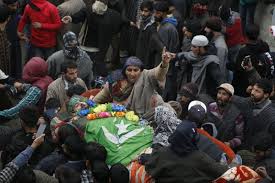Mehbooba, the mother of Saqib Bilal Sheikh, one of the four youngest militants to have been killed by government forces in gunfights recently, picks up her son’s costly watch and kisses it repeatedly.
“This is what he has left for me,” she said, sitting in a room where Saqib would study. Sitting in the room also are about 30 of Saqib’s friends, many of whom were hunched over their smartphones watching his pictures and videos of his funeral. A few were arranging his books on a shelf.
Mehbooba thanks God for “choosing her to be a martyr’s mother” and says she wasn’t as pained by his death in the gunfight than the sight of his mutilated body.
“What hurt me the most was that they had fired into his eye after killing him. His classmates would often tease him and ask why he applies lipstick and he would tell them he was born with red lips. The forces had cut the same lips perhaps with a sharp edged weapon. I will never forget his face. It will haunt me till I am alive. Forces shouldn’t damage the body parts of militants once they are dead,” she said.
Before entering the Sheikhs home at Parray Mohalla, Hajin, the once infamous nursery of dreaded counterinsurgency militia Ikhwan, the neighbours make it a point to talk about the family’s affluence, probably implying the comforts the boy sacrificed–his father, a government employee, owns about a 100 kanals of land, a large herd of cattle, etc.
“My son was living like a king. He would wear costly shoes, branded clothes, liked perfumes and watches,” says Mehbooba. Meat and eggs were his favourite foods. The boy was pampered because his elder brother had been adopted by an uncle and he was the only male kid in the family. Saqib has a sister aged 10.
Saqib was a good student too. He had secured 378 marks out of 500 in class 10. He was in standard 11 when he picked up arms.
“I would always ask him why he was not studying hard and he would say he would get good marks,” Mehbooba said. Saqib had other talents too, as his uncle Aijaz Ahmad discovered after he was contacted by the head of a local NGO that was looking for a boy who could act in a play called “Wath Che Yehai—This is the Way”.
“The first image in the play that struck my mind was that of my nephew. He played the role of the son of a blacksmith who aspired to go to school but couldn’t due to poverty,” says Aijaz.
“Saqib won applauds for his work in the serial and the next year he got a role in the Bollywood movie Haider,” he said. Saqib liked soccer and would often play at Hajin Eidgah, the same ground he was seen the last time before joining militancy.
On August 31 this year, he went to his maternal house, a few kilometers away from his home. His grandparents had returned from the Haj pilgrimage.
“He would never go anywhere without me and on that day I was with him. I asked him to get some meat for his grandparents. It was strike in our area,” says Mehbooba.
“Saqib didn’t return till late evening. I started looking for him and saw one of his friends who told me that Saqib had told him to tell me that he couldn’t find meat anywhere and was going to Eidgah ground to play football.”
At Eidgah, 14-year-old Mudasir of Mir Mohalla, Hajin, was playing football. Mudasir met Saqib and both disappeared on a motorbike.
“Mudasir told us that he will be back in five minutes but he didn’t return,” said a friend of the teenager who also was killed in the gunfight along with Saqib in Mujgund area on Srinagar outskirts.
Saqib’s disappearance sent the family in a huddle to seek help from various quarters, including godmen. More than Rs 50,000 were donated to peers.
“Some godmen told us to sacrifice animals and we must have sacrificed almost a dozen animals so that he would return,” said Mehbooba.
To drive home the point that Saqib never appeared a potential militant, she said, “We believed he might have an affair with some girl and might have been kidnapped by her relatives. We never thought he would pick up arms as he never showed any inclination towards militancy.”
Even on the day of the gunfight, Mehbooba said, the police were not sure that Saqib was trapped in a house in Mujgund.
“A police officer told us Mudasir was trapped along with two foreigners and Saqib wasn’t there. We had tea, lunch and dinner as usual. At the police control room did we identify his body,” she said.




